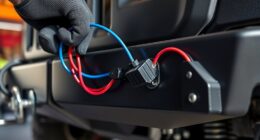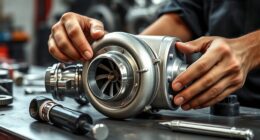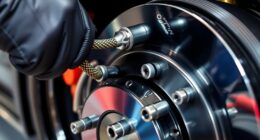Hyundai’s CVVD technology dynamically adjusts valve timing in real-time, helping you tune your engine for better performance and fuel efficiency. It changes how long valves stay open depending on driving conditions, allowing for smoother power delivery and improved economy. This advanced system reduces stress on your engine and enhances durability. If you want to understand how this innovative technology can boost your tuning gains, there’s more to discover about its mechanisms and benefits.
Key Takeaways
- CVVD dynamically adjusts valve timing in real-time, optimizing engine performance for different driving conditions.
- It enhances tuning gains by improving fuel efficiency and power output through precise valve duration control.
- Variable valve timing reduces engine stress and wear, contributing to longer engine lifespan and reliability.
- CVVD allows smoother throttle response and acceleration, improving overall driving responsiveness.
- Integrating CVVD technology with tuning strategies results in better emissions, lower fuel costs, and enhanced engine efficiency.

Hyundai’s CVVD (Continuously Variable Valve Duration) technology is transforming engine efficiency by dynamically adjusting valve timing to optimize performance and fuel economy. Unlike traditional systems that rely on fixed valve timings, CVVD continuously modifies how long the valves stay open, responding in real-time to driving conditions. This means your engine can operate at peak efficiency whether you’re cruising on the highway or idling in stop-and-go traffic. By fine-tuning the valve duration, Hyundai’s CVVD guarantees that each combustion cycle is optimized for the current load, helping you get more miles per gallon while maintaining strong performance.
Hyundai’s CVVD optimizes engine efficiency by adjusting valve timing in real-time for better fuel economy and performance.
Understanding how variable timing impacts engine efficiency is key to appreciating CVVD’s advantages. In conventional engines, fixed valve timing limits flexibility, often forcing the engine to compromise between power and fuel economy. CVVD removes this barrier by offering a seamless transition between different valve durations. For example, during light throttle operation, the system shortens the valve open time, reducing airflow and minimizing fuel consumption. Conversely, when you demand more power, it lengthens the valve open duration to allow greater airflow, giving you the performance you expect. This continuous adjustment helps your engine breathe better and burn fuel more efficiently across a wide range of conditions.
You’ll notice that with Hyundai’s CVVD, the engine responds more smoothly and efficiently. The system’s ability to adapt in real time means less waste, as the engine doesn’t need to operate in overly conservative or aggressive modes all the time. Instead, it intelligently tailors its operation, resulting in less emissions and lower fuel costs. Plus, by optimizing the combustion process with variable timing, CVVD reduces engine stress and wear, extending the lifespan of your vehicle’s engine. That’s a win for both your wallet and the environment.
Moreover, Hyundai’s innovation in variable timing isn’t just about improving efficiency; it enhances driving experience. You get a more responsive engine that adapts instantly to your throttle input, making acceleration smoother and more precise. The system’s ability to fine-tune valve duration in real-time means less hesitation and a more enjoyable drive overall. When you combine this with Hyundai’s focus on durability and performance, you realize that CVVD isn’t just a tech upgrade—it’s a thorough improvement that elevates how your engine performs under various conditions.
In essence, Hyundai’s CVVD transforms traditional engine operation by making valve timing a continuously adaptive process. This innovation allows for improved engine efficiency, better fuel economy, and more refined driving dynamics. As a driver, you benefit from a vehicle that intelligently manages its performance, saves you money at the pump, and helps reduce your environmental footprint—all thanks to advanced variable timing technology. Additionally, the integration of such systems aligns with the broader relationships between engine components and vehicle performance, emphasizing Hyundai’s commitment to innovative engineering.
Frequently Asked Questions
What Maintenance Is Required for Hyundai’S CVVD System?
You should perform regular maintenance on your Hyundai’s CVVD system by sticking to scheduled oil changes and filter replacements. Using the right oil and replacing filters on time helps keep the CVVD components operating smoothly and prevents buildup that could impair performance. Check your owner’s manual for specific intervals. Consistent maintenance guarantees your CVVD system functions efficiently, maximizing tuning gains and prolonging the lifespan of your engine.
How Does CVVD Compare to Variable Valve Timing?
Imagine a symphony where each instrument plays at its perfect moment—that’s what CVVD does for your engine. Compared to traditional variable valve timing, CVVD continuously adjusts valve timing for ideal valvetrain efficiency, enhancing power and fuel economy. It offers smoother power delivery and better responsiveness, making it superior for power optimization. You get the benefits of advanced tech that fine-tunes performance seamlessly, giving your Hyundai an edge on the road.
Are There Any Known Issues With CVVD Technology?
You might wonder if CVVD technology has issues. While generally reliable, some users report sensor issues that can affect performance. Calibration challenges may also arise, requiring precise adjustments to optimize benefits. These problems are not widespread but can occur if the system isn’t maintained properly. Overall, CVVD is advanced, but staying aware of potential sensor issues and calibration needs helps guarantee smooth operation and tuning gains.
Can CVVD Be Retrofitted Into Older Hyundai Models?
Did you know only 10% of Hyundai models feature CVVD technology? Retrofits face significant challenges because CVVD is integrated into the engine’s control system, making aftermarket options tough. You can’t easily retrofit CVVD into older Hyundai models without extensive modifications, which can be costly and complex. Most owners find it more practical to upgrade to newer models with CVVD rather than attempting to retrofit this advanced technology.
How Does CVVD Impact Long-Term Engine Durability?
You might wonder how CVVD impacts your engine’s durability over time. It improves engine longevity by optimizing valve timing, which helps reduce wear and prevent excessive engine strain. By adjusting the valve operation based on driving conditions, CVVD maintains smoother performance and lowers the risk of parts wearing out prematurely. This technology ultimately keeps your engine healthier longer, saving you money on repairs and enhancing overall reliability.
Conclusion
Now that you understand Hyundai’s CVVD technology, you can see how it optimizes performance and fuel efficiency simultaneously. Did you know that vehicles equipped with CVVD can improve fuel economy by up to 5%? That’s a significant gain for both your wallet and the environment. By tuning your engine with CVVD, you’re not just driving smarter—you’re contributing to a greener future. Embrace this innovative tech and experience the difference on every drive.









